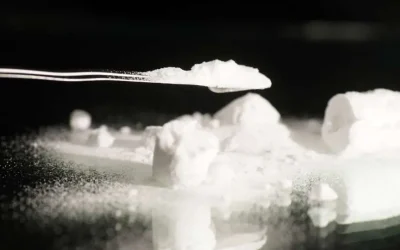Last updated: November, 2025
For many, ecstasy may seem like a harmless party drug; something associated with connection, euphoria, and nightlife. Yet beneath the surface, this stimulant can profoundly affect emotional balance, sleep patterns, and long-term mental health. What starts as occasional use can quietly become dependence, leaving people trapped between moments of artificial happiness and long hours of emotional exhaustion.
Recovering from ecstasy addiction is not just about stopping the substance. It’s about restoring the body’s natural rhythm, understanding the emotional patterns behind use, and learning to live again with balance and clarity. In Spain, individuals can access treatment environments designed to support that full recovery; where light, warmth, and care come together to help rebuild a stable sense of self.
What Is Ecstasy Addiction?
Ecstasy is a synthetic stimulant and hallucinogen that alters how the brain communicates. It’s often confused with MDMA (the main chemical component in many ecstasy pills) but street versions are rarely pure. They may contain other stimulants or toxic additives, increasing both psychological and physical risks.
When consumed, ecstasy increases the release of serotonin, dopamine, and noradrenaline. These neurotransmitters regulate mood, motivation, and energy. The result is an initial sense of pleasure, confidence, and empathy, but also a sudden depletion once the effects fade. Over time, this cycle disrupts the brain’s natural balance, leading to cravings and emotional instability.
How Ecstasy Affects the Brain
The substance temporarily floods the brain’s reward system with serotonin and dopamine, producing sensations of connection and euphoria. But as levels crash, feelings of emptiness, irritability, and confusion often appear. With repeated use, this imbalance can make it harder for the brain to produce these chemicals naturally, leaving individuals emotionally dependent on the drug.
Why Ecstasy Becomes Addictive
Ecstasy addiction develops when the person begins to rely on the drug to feel relaxed, social, or alive. The experience becomes less about fun and more about relief. Over time, tolerance grows (requiring higher doses for the same effect) and stopping suddenly may trigger mood swings, insomnia, and anxiety. What once felt like choice becomes compulsion.
Effects and Risks of Ecstasy Use
Ecstasy affects both the mind and body in complex ways. Its impact may vary depending on purity, frequency, and personal health, but the risks remain real.
Short-Term Effects
In the short term, users often experience heightened sensory perception, empathy, and physical energy. However, these effects are followed by dehydration, muscle tension, jaw clenching, insomnia, and exhaustion. The “comedown” phase (when dopamine and serotonin levels crash) can cause sadness or depression that may last for several days.
Long-Term Consequences
Prolonged or frequent use can disrupt sleep cycles, memory, and concentration. Many people develop chronic fatigue, anxiety, or emotional numbness. Over time, the overstimulation of the nervous system increases the risk of heart complications, blood pressure irregularities, and severe mood disorders such as paranoia or prolonged depression. Even when physical dependence is mild, psychological attachment can be strong.
Recognising the Signs of Ecstasy Dependence
Ecstasy dependence often begins subtly. What seems like social or recreational use can turn into an emotional escape. Recognising the early signs helps prevent deeper harm.
Behavioural and Emotional Signs
A person may begin to prioritise parties or social events where ecstasy is available. They may think about using frequently, struggle to meet obligations, or isolate from non-using friends. After use, irritability, sadness, or a flat mood can appear, often followed by denial or minimising the problem.
Physical and Cognitive Symptoms
Persistent tiredness, irregular sleep, jaw pain, and weight loss are common indicators. Many experience difficulty concentrating, forgetfulness, or lingering anxiety between doses. When these patterns interfere with daily functioning, professional support becomes essential.
Treatment and Recovery Options in Spain
Healing from ecstasy addiction involves more than detox: it requires restoring both emotional stability and physical health. In Spain, treatment programmes are designed to combine medical supervision with compassionate, holistic care.
Medical Detox and Stabilisation
Detoxification is the first step to clear the body safely from the substance. Under professional supervision, individuals receive medical monitoring and nutritional support to restore energy and balance. This process helps reduce withdrawal symptoms like insomnia, irritability, or restlessness while re-establishing a sense of calm.
Therapy and Counselling
Therapy addresses the emotional roots of addiction (loneliness, stress, or unresolved pain). Cognitive-behavioural therapy (CBT) helps reframe thought patterns, while mindfulness and trauma-informed approaches guide individuals to recognise triggers and develop coping skills. Group sessions offer shared understanding and connection, key elements for long-term resilience.
Holistic and Nature-Based Healing
Many recovery centres in Spain, including Hacienda Paradiso, integrate nature as part of the healing process. Gentle exercise, yoga, balanced meals, and rest in natural surroundings help the body recover its natural rhythm. As clarity returns, individuals begin to rebuild trust in themselves and reconnect with life beyond the drug.
Why Choose a Drug Detox Center in Spain
Spain has become one of Europe’s preferred destinations for addiction recovery, and not by chance. The Mediterranean climate, open landscapes, and peaceful rhythm of life naturally support the emotional restoration needed after substance use.
The abundance of sunlight helps regulate sleep and mood through serotonin balance, while the mild weather allows for outdoor activities and gentle movement even during detox. Nature becomes part of therapy: walking, breathing, and observing the landscape create a quiet form of mindfulness that helps replace chaos with calm.
Another key advantage is the international expertise of Spanish rehab centres. Many facilities welcome people from around the world and offer English-speaking professionals trained in addiction psychology and holistic recovery. The environment tends to be private, non-judgmental, and designed to feel safe; something essential when confronting deep emotional change.
Unlike in other countries, admission times in Spain are often short, which allows individuals to begin treatment quickly and reduce the risk of relapse. Choosing a detox centre in Spain means gaining both distance from old triggers and closeness to a more balanced way of living.
Why Hacienda Paradiso Stands Out in Addiction Recovery
Located in the heart of Andalusia, Hacienda Paradiso is the world’s first eco-rehab, offering a unique space where recovery unfolds in harmony with nature. Surrounded by sunlight, gardens, and mountain air, residents find a sense of calm that gently supports the healing of body and mind.
The programmes combine clinical excellence with human warmth, medical detox, therapy, and holistic practices tailored to each individual. The goal is not only to overcome addiction but to rediscover presence, confidence, and emotional steadiness.
Hacienda Paradiso has been recognised as Most Affordable Luxury Rehab in Europe by World’s Best Rehab Awards, highlighting its commitment to exceptional care in a serene, eco-sustainable environment.
Frequently Asked Questions: Ecstasy Addiction Rehab in Spain
Early signs of ecstasy addiction often appear as changes in mood, energy, and behaviour. A person may start seeking parties or environments where the drug is available, neglect responsibilities, or experience strong emotional drops after use. Over time, sleeping problems, fatigue, or irritability become common. What begins as curiosity can evolve into emotional dependence when the drug is used to escape discomfort or sadness. Recognising these patterns early allows for timely support and intervention before they become deeply rooted. If someone close to you shows these signs, gentle conversation and professional guidance can make a difference.
Long-term ecstasy use can significantly impact both mental and physical health. Frequent exposure to the drug disrupts serotonin and dopamine balance, often leading to persistent low mood, anxiety, and memory issues. Physically, users may experience insomnia, jaw pain, weight loss, or even heart complications due to increased blood pressure and dehydration. Beyond these symptoms, the real danger lies in emotional burnout and loss of motivation (when joy and energy seem to fade outside of the drug’s effect). With comprehensive treatment, the brain can gradually restore its natural balance, but the process requires time, rest, and care.
While some individuals manage to reduce or stop their use independently, lasting recovery from ecstasy addiction often requires structured support. The emotional and neurological effects of the drug can make self-regulation difficult, especially when withdrawal symptoms such as anxiety, irritability, or exhaustion appear. A professional rehab programme provides medical supervision, therapy, and emotional guidance in a safe environment; something that is hard to recreate alone. For many, inpatient treatment in Spain offers both physical distance from triggers and the psychological safety needed to rebuild healthy routines.
Detoxing from ecstasy typically focuses on restoring the body’s natural balance rather than managing severe physical withdrawal. Most symptoms are psychological: fatigue, restlessness, sleep disruption, or low mood. In a professional detox setting, these effects are monitored and eased through medical supervision, hydration, and nutritional support. Emotional wellbeing is equally prioritised: rest, counselling, and gentle physical activity help the nervous system stabilise. Although ecstasy withdrawal is rarely life-threatening, guidance during this phase helps prevent relapse and prepares the individual for deeper therapeutic work.
Hacienda Paradiso offers a calm and restorative setting where individuals can heal surrounded by nature. Located in Málaga, Spain, it combines medical expertise with holistic care: integrating therapy, detox, and emotional recovery in a private, eco-friendly environment. The warm Mediterranean climate, outdoor spaces, and compassionate staff help create a sense of peace essential for recovery. Each programme is tailored to personal needs, ensuring not only safety and structure but also the emotional connection that makes healing sustainable. At Hacienda Paradiso, recovery is more than abstinence—it’s the rediscovery of balance, purpose, and calm.









